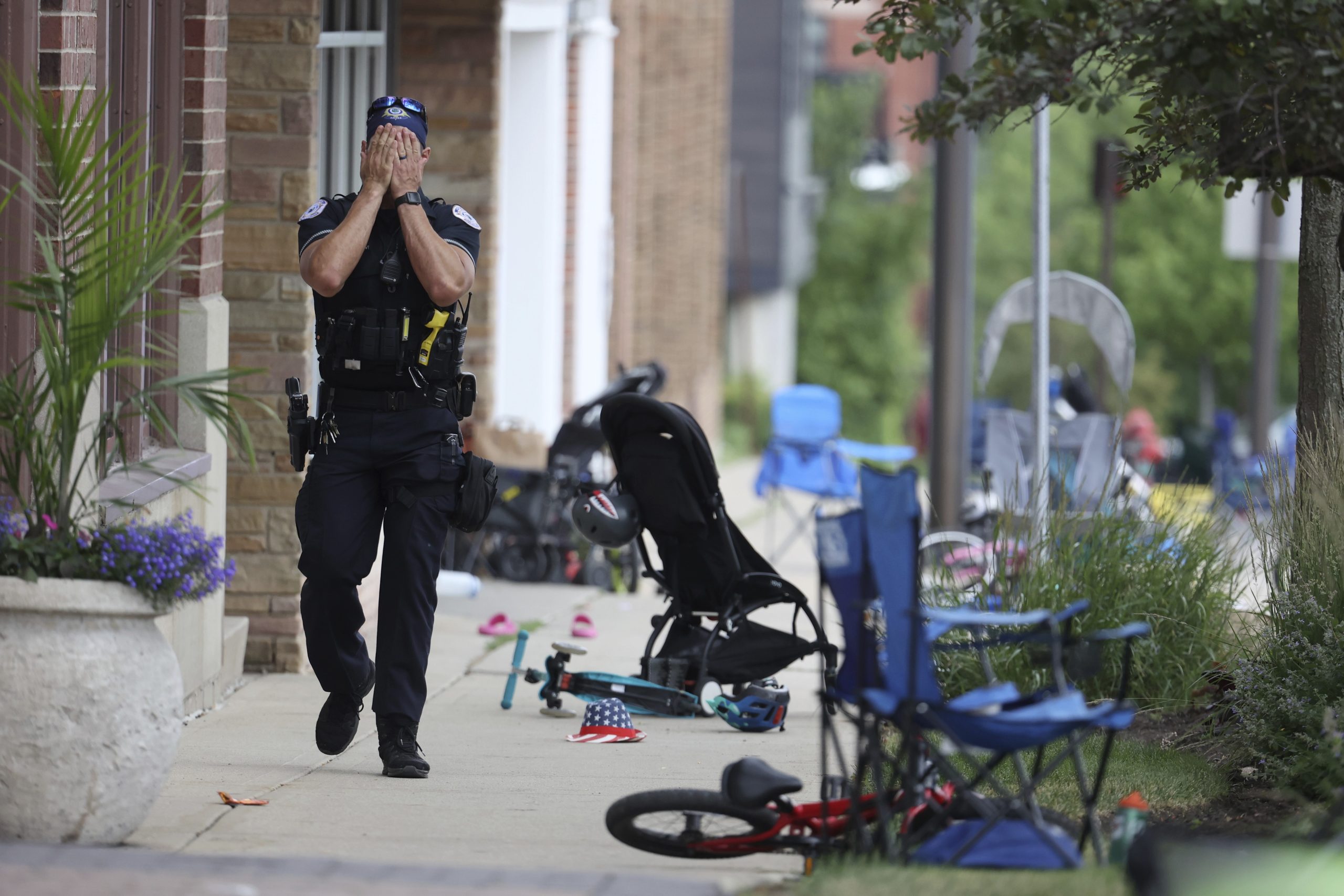News
How polarization in the U.S. thwarts state-level efforts to toughen red flag laws

A police officer from Lake Forest, Ill., walks down Central Avenue after a gunman fired on the Fourth of July parade in Highland Park, Ill., Monday, July 4, 2022, . THE CANADIAN PRESS/AP-Chicago Tribune, Brian Cassella
HIGHLAND PARK, Ill. — Not even some of the most stringent gun control and red flag laws in the U.S. are able to guarantee that high-powered assault weapons don’t end up in the wrong hands in the state of Illinois.
The problem — part of it, at least — surrounds the state in virtually every direction.
Wisconsin up north, Iowa and Missouri to the west, Kentucky in the southeast and Indiana right next door, sharing not only the Lake Michigan shoreline but a decent chunk of America’s third-largest metro area, Chicago.
The advocacy group Everytown for Gun Safety rates Illinois sixth in the country for the strength of its gun laws, while every one of the five states that border it receive failing grades.
The political and cultural patchwork of the United States is just one small part of what makes America’s gun problem so vexing.
Seven people were killed and 38 people were injured Monday in Highland Park, a leafy suburb north of Chicago, when a lone gunman, perched on a roof of a sportswear store and disguised in women’s clothing, used an AR-15-style rifle to open fire on parade spectators, unleashing more than 80 rounds on the defenceless crowd.
“Illinois has fairly strict laws,” said E.J. Fagan, a political-science professor at the University of Illinois Chicago.
“The problem is Highland Park is, what, 10 miles south of Wisconsin? So even if Illinois has very strict laws, Wisconsin is largely controlled by the Republican party.”
Chicago — a city famous for its gun violence — suffers mightily from its proximity to Indiana, which ranks 25th on Everytown’s report card thanks to lax restrictions and a gun-violence rate that has soared 57 per cent in the last 10 years.
Neighbouring states, of course, are far from the only problem in Illinois.
The alleged gunman — Robert Crimo, 21, who police say admitted to the shooting and now faces seven counts of first-degree murder — obtained his weapons in Illinois after his father co-signed his application.
That’s despite the fact that police had twice before encountered Crimo: once in April 2019 in response to an attempted suicide, then again in September, when a family member reported that Crimo had a collection of knives and that he was threatening to “kill everyone.” No charges or complaints were filed.
Under the red flag law, gun purchases can be denied to people with felony convictions, drug problems or if they are deemed capable of harming themselves or others — but only with court approval. That can only come if someone petitions the court in the first place. In Crimo’s case, no one did.
In a brief phone interview aired Thursday with ABC News, Crimo’s father, Robert Jr., insisted that the police encounters were minor and defended his decision to sponsor his son’s gun permit application.
“That’s all it was … a consent form to allow my son to go through the process,” he said. “They do background checks. Whatever that entails, I’m not exactly sure. And either you’re approved or denied.”
Which, of course, raises a different question: What good are the rigid gun control measures and red flag laws in Illinois if they couldn’t prevent the Fourth of July massacre in the first place?
Even in red-flag states, authorities can only do so much when a responsible adult vouchsafes for their child, said Alexandra Filindra, a UIC politics professor who specializes in gun laws.
“It’s very easy, apparently, for cases like this to fall through the cracks, and we’ll see this happening more and more,” Filindra said.
“With 400 million firearms in civilian hands, there is only so much that the limited gun control laws that we have can do.”
At the federal level, political gridlock in Congress and the sway the gun lobby holds over Republicans has made meaningful progress all but impossible since 1994, when soaring crime rates spurred both sides to impose a 10-year ban on assault weapons that expired 10 years later.
But after two deadly shootings earlier in May — the first in a Buffalo, N.Y., supermarket that killed 10, then two weeks later in Uvalde, Tex., where 19 children and two teachers were gunned down — a bipartisan core of U.S. lawmakers came together to pass what some observers have called the most significant gun legislation in a generation.
It included $750 million for states to operate crisis intervention programs, including those that function under red flag laws, as well as for courts that deal specifically with veterans and mental health and drug issues.
It closed the infamous “boyfriend loophole,” which excluded intimate partners living in a different domicile from restrictions designed to deny weapons to anyone convicted of domestic violence.
The new law, signed by President Joe Biden last month, also encourages states to start including juvenile records in the federal system for criminal background checks.
Even the bill’s advocates have acknowledged it doesn’t go far enough — particularly those calling for higher age limits and a restoration of the now-expired assault weapons ban from the Bill Clinton era.
But it’s not nothing, Fagan said.
“It seems like there’s some consensus developing that states should have more resources to get guns out of the hands of people who obviously shouldn’t have them,” he said.
“I actually think we should be encouraged by that. It is the most significant bipartisan legislation, essentially, in the modern era of gun laws.”
This report by The Canadian Press was first published July 7, 2022.
James McCarten, The Canadian Press





















